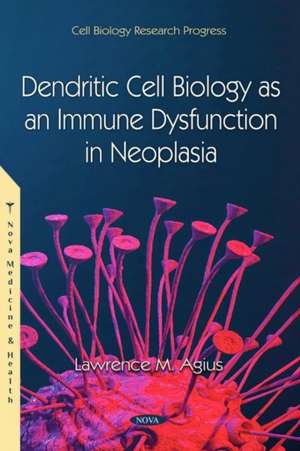Dendritic Cell Biology as an Immune Dysfunction in Neoplasia
Autor Lawrence M. Agiusen Limba Engleză Paperback – 27 feb 2022
Preț: 506.66 lei
Preț vechi: 649.34 lei
-22% Nou
Puncte Express: 760
Preț estimativ în valută:
96.95€ • 100.17$ • 80.65£
96.95€ • 100.17$ • 80.65£
Carte disponibilă
Livrare economică 26 februarie-12 martie
Preluare comenzi: 021 569.72.76
Specificații
ISBN-13: 9781685074869
ISBN-10: 1685074863
Pagini: 198
Dimensiuni: 152 x 229 mm
Greutate: 0.3 kg
Editura: Nova Science Publishers Inc
Colecția Nova Science Publishers Inc
ISBN-10: 1685074863
Pagini: 198
Dimensiuni: 152 x 229 mm
Greutate: 0.3 kg
Editura: Nova Science Publishers Inc
Colecția Nova Science Publishers Inc
Cuprins
Preface; Active Participation of Dendritic Cells in Tumor Cell Immune Evasion; Aging-Induced Aberrant Dendritic Cells in Terms of Highly Proliferative Tumor Cell Clonal Subsets; Sustained Metabolic System Imbalance as Induced Immune Suppression of Dendritic Cells in Tumor Neoantigenicity Profiles; Inclusive Loss of Integrity of The Antitumor Immune Response as Chemokine Patterns of Nonrecognition; Incongruent Biology of Redistributed Chemokine Action in Carcinogenesis; The Nature of Modulated Redistribution of Integral Immunity as System Redefinition of Clinical Non-Responsiveness to the Antitumor Antigenicity; Complexity of Inter-Activities of Suppressed Immune Response with Dendritic Cell Development and Differentiation in Tumors; System Profiles of Dendritic Cell Motility as Modeled Tumor Cell Proliferation and Spread; Duality of Unstable Dynamics of Emerging Tumor Cells and of Infiltrating Dendritic Cells in Carcinogenesis; Systems of Predetermination of Cytokine/Chemokine Action Towards Cancer Antigenicity in Terms of Dendritic Cell Plasticity; Exosome System Preferences as Integral to the Immune Response and Immune Non-Response to Tumor Neoantigens; Constitution of a Failed Antitumor Immune Response as Carcinogenesis Sustainment; Multiple Models of Failed Immune Responses Redefine Carcinogenesis; Effect Dominance of Integral Cytokine/Chemokine Networks in Tumor Cell Antigenicity Response; Incongruent Dislocation of Epitope Spread as Immunosuppression Dynamics of Tumor Cell Clones; Systems of Immune Evasion are Inherent to the Inflammatory Response to Tumorigenesis; Heterogeneous Dendritic Cell Subset Interchange as Tumor Immunosuppression; Recurrent Immune Responses Are Primary Reactivity to the Tumor Microenvironment Rather Than to the Integral Tumor Cells Themselves; The Immunologic Non-Response is a Physiologic, Conditional and Homeostatic State of an Integral Immune System Towards Tumor Antigenicity; Dendritic Cell Plasticity as History of Performance Dynamics; Contact Mechanics of Immune Evasion Involve Suppression of The Antigen-Presentation Step and of the Tumor-Mirrored Migration of the Dendritic Cells; Microenvironmental Reproducible Immunomodulation as Proposed Growth and Spread of Malignant Cells in Terms of Neoantigenicity; Tumor Cell Necrosis Modulates the Immune Tolerance Induced by the Tumor Microenvironment; Index.
